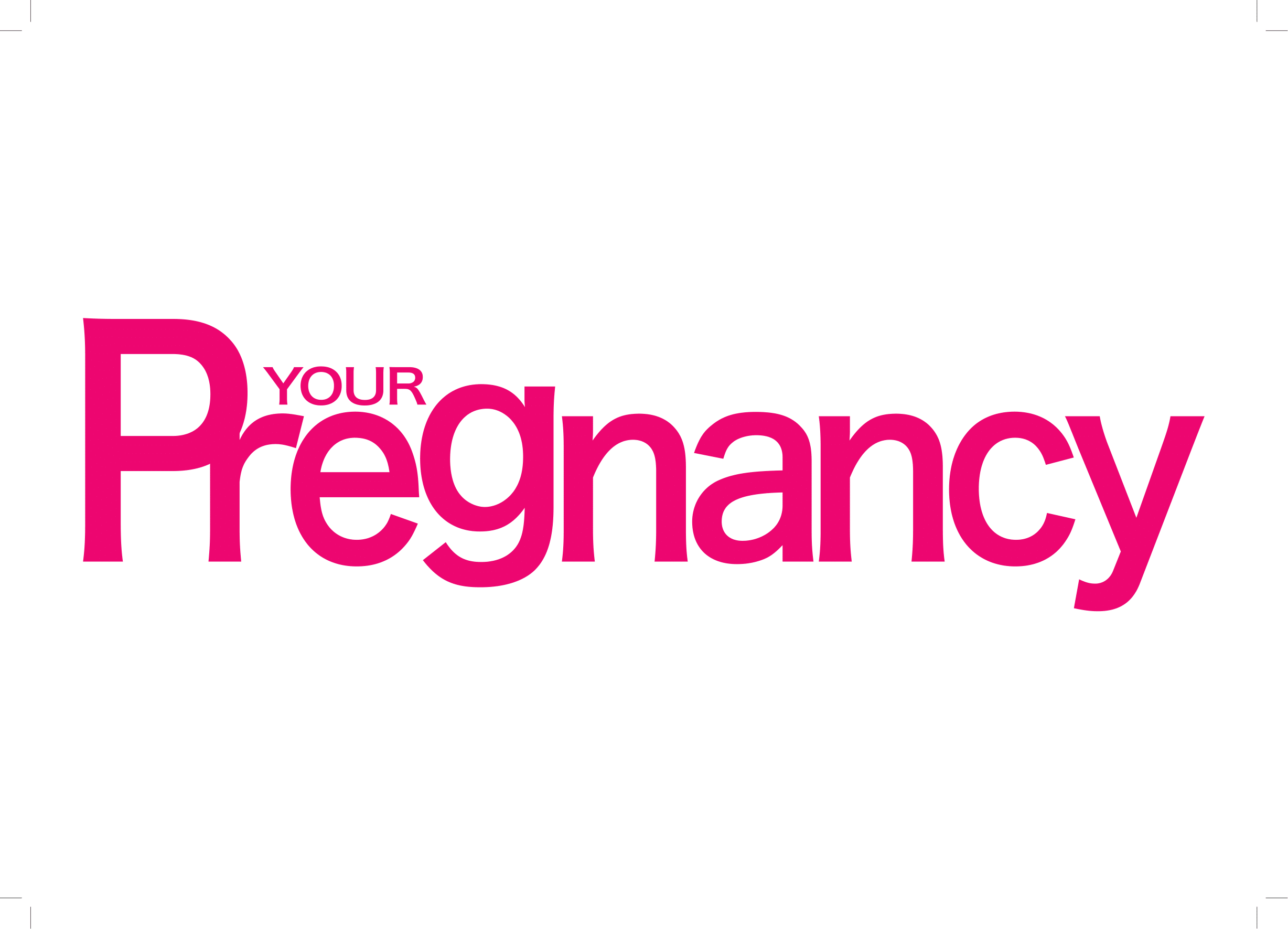
By the end of your first trimester, your baby is already fully formed. He is about 10 centimetres long and weighs around 28 grams (about the same as a slice of bread). Your baby will have arms, hands, fingers, feet and toes, will be able to open and close his mouth, and his circulatory and urinary systems will be working.
All this happens in the short time from conception so it’s a critical 12 weeks between fertilised egg and recognisable proto-human.
For planned pregnancies, you can take care with what you do and eat; if unplanned, this is the time your body will be telling you that something’s up – best you listen.
Read: I'm pregnant! Now what?
How do you know?
Some women give off that glorious pregnancy glow from the first trimester; others spend it hanging over the loo. “Physiological adaption to hormonal changes at this stage of pregnancy usually results in symptoms such as nausea or vomiting, lower abdominal pains, leg cramps, shortness of breath and excessive heartbeats,” says Johannesburg gynaecologist Dr Kiran Kalian.
Take note:
- If you’re taking any kind of medication make sure to speak to your doctor as soon as you start trying to fall pregnant, or if unplanned then as soon as you are expecting to see if this medication is safe.
- Stop smoking, taking drugs or drinking alcohol.
- Avoid raw meats, deli meats, raw seafood, raw eggs, unpasteurised cheese (soft cheeses such as Brie and Camembert). Also limit or avoid caffeine.
- Also read: Best and worst foods to eat during pregnancy
Here are a few other flags that you have a baby on board:
- Breast tenderness and morning sickness. These are the earliest signs of pregnancy.
- Bleeding. About a quarter of pregnant women have slight bleeding during the first trimester – this light spotting may be a sign that the fertilised embryo (egg and sperm) has implanted in the uterus. Always visit your doctor if you experience bleeding.
- Discharge that is thin and milky is common. Don’t use a tampon during pregnancy as it can introduce germs.
- Tiredness. Growing a little human is hard work.
- Food cravings/aversions.
- Plenty of pee stops. Don’t hold it in, and don’t stop drinking fluids – your body needs them.
- Heartburn.
- Mood swings.
- Weight gain. During the first trimester, you should gain about 1.5 to 3kg. “Healthy eating is recommended and a balanced diet is key,” says Dr Kalian. “But the pregnant mother needs to understand that eating should be restricted to enough for one person, not two.” You only need about 700 extra kilojoules a day during the first trimester – the equivalent of half an apple and a tablespoon of peanut butter.
Interesting: When does an unborn baby start to breathe?
What should you do?
Assuming a healthy lifestyle, with a good diet and regular exercise, most women should be able to continue life as usual while they’re pregnant. “The healthy pregnant mother should be able to do all the activities she did prior to pregnancy,” says Dr Kalian.
“Pregnancy shouldn’t be considered a disease.” If, however, you haven’t been giving your body the attention it needs, it’s never too late to start.
The most important thing is to take a good pregnancy multivitamin. Ask your doctor or pharmacist for advice. Also you need to add folic acid, a B vitamin that promotes healthy red blood cells and helps to prevent serious birth defects. Your body doesn’t make this vital substance – it has to be taken daily through food or supplements.
“Folic acid supplementation is essential in the first 12 weeks of pregnancy, and should preferably be started before conception,” says Dr Kalian.
However, there are some vitamins you should not be taking. “Vitamin A, D and E supplementation is not recommended in pregnancy,” Dr Kalian advises.
Also read: 10 weeks pregnant? Things to know
Your first antenatal appointment
Many women use a home pregnancy test to confirm what they suspect. The next step is to see a medical practitioner for official confirmation, and to check that all is well.
“It’s recommended that the mother be seen as early as six to seven weeks to confirm an intrauterine pregnancy, and assess general health and risk factors that might influence the pregnancy,” says Dr Kalian.
“The next crucial visit to the gynaecologist should be at 11 to 14 weeks for first trimester Down syndrome screening, assessment for risk of preterm labour, and high blood pressure that is specific to pregnancy (this is called preeclampsia).”
What to expect at your first appointment
Your medical practitioner will ask you about:
- Your general health and medical history (including chronic conditions, allergies, psychiatric issues, and habits such as smoking, drinking or drug use).
- Your family’s medical history (including whether any relatives have any chronic or serious conditions that may be hereditary).
- Your periods – if they’re regular and how long they last for.
- When the first day of your last period was (to determine your due date).
- Any symptoms or problems you’ve noticed since your last menstrual period.
- Any gynaecological problems (including sexually transmitted infections).
- Details about any previous pregnancies and births.
- Whether you, the baby’s father, or anyone in either family has a chromosomal or genetic disorder, had developmental delays, or was born with a structural birth defect. You’ll be offered various screening tests, including a blood test that’s done at 9 to 13 weeks and, if it’s available, an ultrasound at 11 to 13 weeks.
Must read: Your preggie to-do list
Your medical practitioner will do
- A physical examination.
- A pelvic exam if necessary, including a Pap smear (unless you’ve had one recently).
- Possibly a culture to check for chlamydia and gonorrhea.
- A urine sample.
- Blood tests to identify your blood type, rhesus factor and check for anemia (low iron count), as well as test for HIV, syphilis, hepatitis B and immunity to rubella (German measles) and chicken pox.
What you should ask your medical practitioner
Now is the time to raise any concerns you may have, no matter how trivial they may seem. Ask your doctor about:
- Any medications and/or supplements you’ve taken since your last period, and your use of alcohol or drugs.
- Any exposure you may have had to potential toxins (bring a list of these, especially if you live near or work around toxic materials).
- Where and when you’ll be giving birth.
- Your options for giving birth (a “birth plan”).
Rhesus: Positive or negative?
What is the Rhesus Factor?
A blood test is performed on all pregnant women to check whether they are rhesus negative or positive.
“In the ideal setting – understanding that resources are limited – your pre-pregnancy screening tests are an Hb for anaemia, a blood group and rhesus test, RPR for syphilis, HIV, Hepatitis B carrier, rubella immunity, varicella immunity, and TSH to check your thyroid function,” says YP expert gynaecologist Dr Bronwyn Moore. Under government healthcare you will have some of these tests (Hb, blood group, rhesus, syphilis, HIV), and only once already pregnant.
If you are rhesus negative and your partner is positive, then your child could inherit either. If the baby is positive and its blood mixes with the mother’s negative blood during birth (called rhesus sensitisation), it could cause problems. The blood might create antibodies to attack this foreign blood.
To avoid this, a rhesus immunoglobin shot will be given to prevent rhesus sensitisation, which can occur during the delivery as the mother’s blood comes into contact with the baby’s (and which then poses a danger in future pregnancies).
*Note: Being rhesus positive or negative has nothing to do with HIV.
Do you have any tips and tricks you'd like to share with fellow Parent24 readers and expectant moms about the first 3 months of pregnancy? Tell us by emailing chatback@parent24.com and we may publish your comments.
Read more:
- What to expect: The first trimester
- 11 things to do when finding out you're pregnant
- First trimester exercises
Sign up to our weekly newsletter to receive Parent24 stories directly to your inbox.




 Publications
Publications
 Partners
Partners














